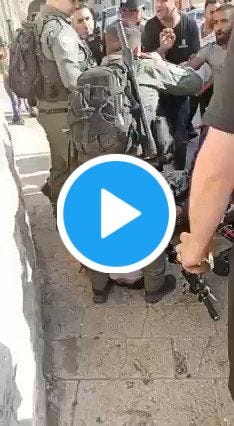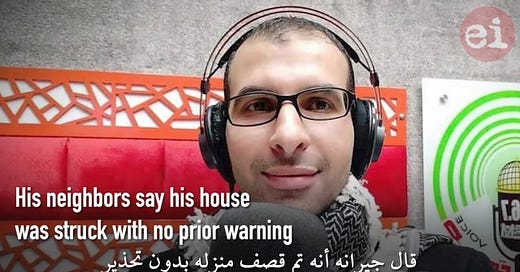The shooting may have stopped in Gaza for now, but Israel is still a racist apartheid regime. Israel is still imposing a military dictatorship on millions of dispossessed Palestinians. And Israel is still enforcing a medieval siege on the Gaza Strip.
Since the ceasefire, Israel killed a Palestinian child in Jerusalem, in what appears to have been an extra-judicial execution. Zuhdi Muhannad al-Tawil, 17, was accused of stabbing a soldier and a settler.
There has also been a massive wave of Israeli repression of Palestinians, in revenge for the protests that swept the entirety of historic Palestine. This has especially targeted Palestinian citizens of Israel. A campaign of arrests, allegedly to support “law and order,” has resulted in more 1,500 people being rounded up — 70 percent of them are reportedly Palestinian citizens of Israel as opposed to Jewish Israelis. The organized gangs of Jewish Israeli pogromists seem to have been mostly left alone — no doubt because Israeli police were often complicit in those attacks.
Meanwhile, Palestinians are counting their losses.
As in all of their wars, Israel deliberately targeted journalists, trying their best to stop the truth about their assault getting out to the world. Bombing from the air, they demolished the al-Jawhara and al-Jalaa buildings, which both contained media offices. The al-Jalaa building housed the bureaus of Al Jazeera and the Associated Press.
Al-Jawhara building housed the offices of APA Images, a Palestinian photojournalism news agency whose services we rely on at The Electronic Intifada. They emailed their customers during the war to promise that “we would like to reassure you that we will keep our services on and you will receive photos and videos as normal.”
Yousif Abu Hussein, a journalist with the Voice of al-Aqsa radio station, was killed during Israel’s bombardment. His neighbours say his home was bombed with no prior warning.
Yet despite all this, my union, Britain’s National Union of Journalists, still refuses to call Israel what it is: apartheid.


During the war on Gaza, Israel blocked international journalists from entering the Strip. Yet the BBC didn’t report on this fact until after the ceasefire went into effect. I asked the BBC’s Middle East editor why, and this was his response. International journalists are now being allowed in, but in my view the BBC should have also covered this important aspect of the story.
My articles this week
I wrote this investigative piece diving into the extremists who attended the pro-Israel demonstration in London the Sunday before last. It wasn’t only Tommy Robinson: there was a whole host of far-right racists who came along.
Podcast ep 35: Gaza and Jerusalem
With the war in Gaza and the rest of Palestine intensifying, we ramped up our output of podcasts. In this episode we talked to our fellow podcasters from Palestine Pod, one of whom still has family in Gaza. And in the second segment of the show, we talked to Joharah Baker, a Palestinian journalist who lives in the Old City of Jerusalem.
Podcast ep 36: The armed resistance
Our colleague Ali Abunimah joined us for this episode, with Jon Elmer, to discuss the Palestinian armed resistance in Gaza. Jon has some really interesting insights, and this episode was a real hit with our viewers and listeners. We filmed it just as news of the ceasefire was coming through.
Podcast ep 37: The media war
Contributor to FAIR (Fairness and Accuracy in Media Reporting), EI writer and author Greg Shupak joined us on this episode to discuss the corporate media’s (mis)reporting of Palestine.
Tweet of the Week


The ceasefire has meant that things have now got back to “normal” in Palestine — which is exactly the problem.





